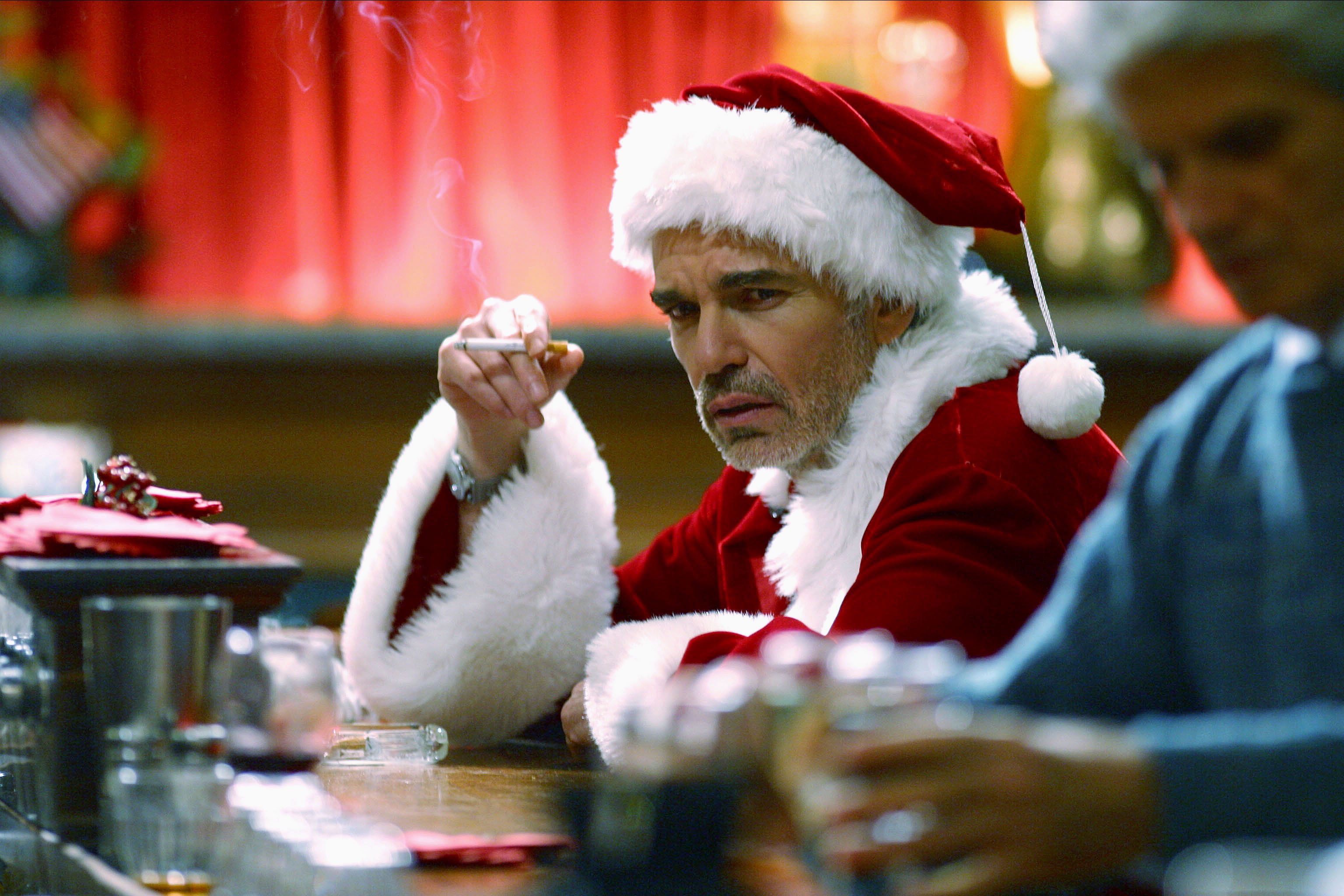Bad Santa is the greatest holiday movie of all time
This film manages to perfectly excoriate the tinseled superficiality of the season


A free daily email with the biggest news stories of the day – and the best features from TheWeek.com
You are now subscribed
Your newsletter sign-up was successful
There are certain seminal Christmas films whose yearly broadcast becomes an indelible part of the season. The holly-jolliest people I know plan their holiday parties on the night that A Charlie Brown Christmas and How the Grinch Stole Christmas air on basic cable. Many a hipster holiday shindig has revolved around oh-so-ironically showing Die Hard (complete with bearded film bro explaining that, no, really Die Hard is, actually, the ultimate Christmas movie). Each Christmas Eve, TBS marathons A Christmas Story, and of course, it simply wouldn't be Christmas without the annual airing of It's A Wonderful Life. However, one holiday classic is all-too-often overlooked, eschewed for the more overtly "goodwill toward men" kind of fair: That classic is Bad Santa. This film, which features Billy Bob Thornton as the titular no-good, low-down-dirty Claus, is a louche, mean-spirited romp that somehow ends up encapsulating the true spirit of Christmas — even (or, perhaps, especially) for people like me, who decidedly don't see it as the most wonderful time of the year.
Bad Santa follows Thornton's whiskey-pickled safecracker, Willie T. Soke, as he and his partner, Marcus (Tony Cox), a con artist and thief with dwarfism, rob department store after department store, under the guise of a mall Santa and his plucky elf pal. Willie is a jaundiced husk of a man, living between the legs of his latest no-name conquest whenever he isn't face-down in the alley behind the bar. There's something delightfully subversive about seeing the iconic red Santa suit hang limply over Willie's scrawny frame, his fake beard, puke-flecked and soiled gray, dangling below his whittled jaw. He's a walking (or, more like stumbling), talking (okay, more like profanity-spewing) middle-finger to the fake pieties of the holiday season: the mandate to be cheerful, even if it feels forced; the idea that gifts equal love or attention; and all the superficial kitsch like insipid, cynical debates about Starbucks cups and "the War on Christmas," the non-stop carols, and of course, the department store Santas.
When one particularly bratty, pampered child sits on Willie's lap, the boy sneers that if "you were the real Santa, you could do magic." Nothing is enough for Junior — he's got the good life, a mom and dad who will take him to the mall and presumably purchase whatever he whispers into Santa's ear, but he must have more, he must have magic. This mentality is exactly everything I've always hated about the holidays, the militant insistence on perfection, because perfection is the only path to happiness. I've never had the money to buy friends and family the top-of-their-wish-list kind of gifts. I lack the knack for artifice that makes decorations and tree-trimming and finding the perfect gift wrap appealing. I have no sense of magic, just a dwindling bank account and a lingering resentment at being told to bake and smile and wrap my way through one of the coldest, dreariest months of the year. "You wanna see some magic?" Willie sneers, before shoving the boy roughly away. "Let's watch you disappear." That's my kind of magic, bitter and blunt.
The Week
Escape your echo chamber. Get the facts behind the news, plus analysis from multiple perspectives.

Sign up for The Week's Free Newsletters
From our morning news briefing to a weekly Good News Newsletter, get the best of The Week delivered directly to your inbox.
From our morning news briefing to a weekly Good News Newsletter, get the best of The Week delivered directly to your inbox.
This ever-present, heavily commercialized vision of sugar-plum holiday delight, tinsel-bright and pristine as freshly fallen snow (before the dog pees in it, that is), gives Bad Santa a genuine bite, an impish wickedness that hasn't abated even though the film was released back in 2003. Bad Santa jabs a broken shot glass in the eye of "traditional values" — hell, the movie literally ends with Willie, in his Santa suit, getting mowed down by the cops who've chased him out of the store he's just tried to rob (he survives, of course) — but it isn't an exercise in pure nihilism. Nestled inside this tale of a criminal who decidedly doesn't try to straighten up and fly right is the story of a broken man who finds an odd kind of makeshift family that brings him some comfort and joy, even if it doesn't really knit him whole again.
While playing up his Santa act, Willie encounters young Thurman Merman (Brett Kelly), a bullied and desperately lonely child living in a cold, abandoned mansion with his elderly, almost non-responsive grandmother; his mother has run off, and his father is in federal prison, though the boy cleaves to the story that dad is "exploring mountains." Thurman loves Christmas, and not in a phony, holly-jollier than thou kind of way, but with a genuine joy for all the trimmings and trappings. He doesn't go to see Santa because he wants things — his prized possession is a grubby advent calendar — he goes, repeatedly, because he sees Santa as someone he can talk to, one of his only friends. The boy is not terribly bright — he constantly refers to Willie as "Santa," and seems to really believe that this skinny, sallow-cheeked drunk really is jolly ol' Saint Nick — but he is indefatigable in his devotion. Even when Willie deadpans that Santa's beard is so straggly because he "got sick" after he "loved a woman who wasn't clean … Mrs. Santa's sister" (and Thornton's delivery is choke-on-your-popcorn-laughing hilarious), Thurman keeps coming to see him. Sure, the movie pokes fun at Thurman; still, though, it roots for him. After all, the very last scene is him firmly, and triumphantly, kicking his chief tormenter squarely in the nuts.
When the mall's security chief, Gin Slagel (the late Bernie Mac, who is simultaneously menacing and old-school cool) closes in on Willie and Marcus, Willie hides out in Thurman's mansion — after he raids granny's liquor cabinet (and steals Thurman's dad's BMW, and turns the family safe into a piggybank), Willie finds that he is, surprisingly, genuinely moved by the boy's plight. He beats the thundering crap out of Thurman's bullies (while wearing the Santa costume), and teaches the boy how to deliver a masterful blow to the groin (the sequence is a ballet of groin-punches, between Marcus and Willie and Thurman, and yeah, it's the basest form of funny, but it's still really funny). Eventually, Willie takes up with comely bartender Sue (Lauren Graham). Sue is something of a misfit herself (I mean, she does have a Santa Claus fetish), and she has an immediate affinity for young Thurman. The three of them fit together — if not perfectly, then at least close enough. The movie's one nod to sentiment is a brief decorating-the-house montage that ends with Willie and Sue lifting the stockings to hang over the chimney with care from granny's gnarled, callused feet.
These moments of tenderness feel so piercingly clear because they exist, in tandem, with an honest (if, of course, comedically exaggerated) representation of a man who is curdled with depression. Willie isn't George Bailey, or even John McClane, a fundamentally good man driven to the brink, and then coaxed back from it — he's a grade-A jerk. If anything, that makes his goodwill toward men (or, at least, one kid) even more meaningful: It's not in his nature to show kindness, and yet, he muddles through somehow. Because, loathe though he'd be to admit it, it's the right thing to do. During the final heist, right before the police chase that will end with him getting plugged in the back, Willie stops to steal the one toy that Thurman really wants: a stuffed pink elephant. The simplicity of the gift is poignant, given Thurman's wealth and the fact he's a little too old for it — but the fact that Willie even remembers it, let alone risks his neck for it, is a sign that his Grinch heart has grown three sizes. And that growth comes honestly, without raindrops and roses and whiskers on kittens. It's raw. It's real. Even if poor Mr. Elephant does end up razed by bullets in the end.
A free daily email with the biggest news stories of the day – and the best features from TheWeek.com
Bad Santa manages to excoriate the tinseled superficiality of the season, not only through images of Santa puking in the snow or getting frisky with a customer in the ladies' dressing room, but in how it defines family: It doesn't have to be the scrubbed couples bringing their spoiled kids to the mall, stacking the space under the tree with X-boxes and iPhones; it can be a gaggle of weirdos who look after each other, however awkwardly. The movie swaps out the crass sentimentality of "season's greetings" with another kind of crassness, but that crassness only magnifies a more authentic Christmas spirit of doing good for goodness' sake: It's like that ugly Christmas sweater with "Merry Go F--k Yourself" stitched over the chest: snarky and mean, but, in the end, it'll keep you warm.
Laura Bogart is a featured writer for Salon and a regular contributor to DAME magazine. Her work has appeared in The Atlantic, CityLab, The Guardian, SPIN, Complex, IndieWire, GOOD, and Refinery29, among other publications. Her first novel, Don't You Know That I Love You?, is forthcoming from Dzanc.
-
 How the FCC’s ‘equal time’ rule works
How the FCC’s ‘equal time’ rule worksIn the Spotlight The law is at the heart of the Colbert-CBS conflict
-
 What is the endgame in the DHS shutdown?
What is the endgame in the DHS shutdown?Today’s Big Question Democrats want to rein in ICE’s immigration crackdown
-
 ‘Poor time management isn’t just an inconvenience’
‘Poor time management isn’t just an inconvenience’Instant Opinion Opinion, comment and editorials of the day
